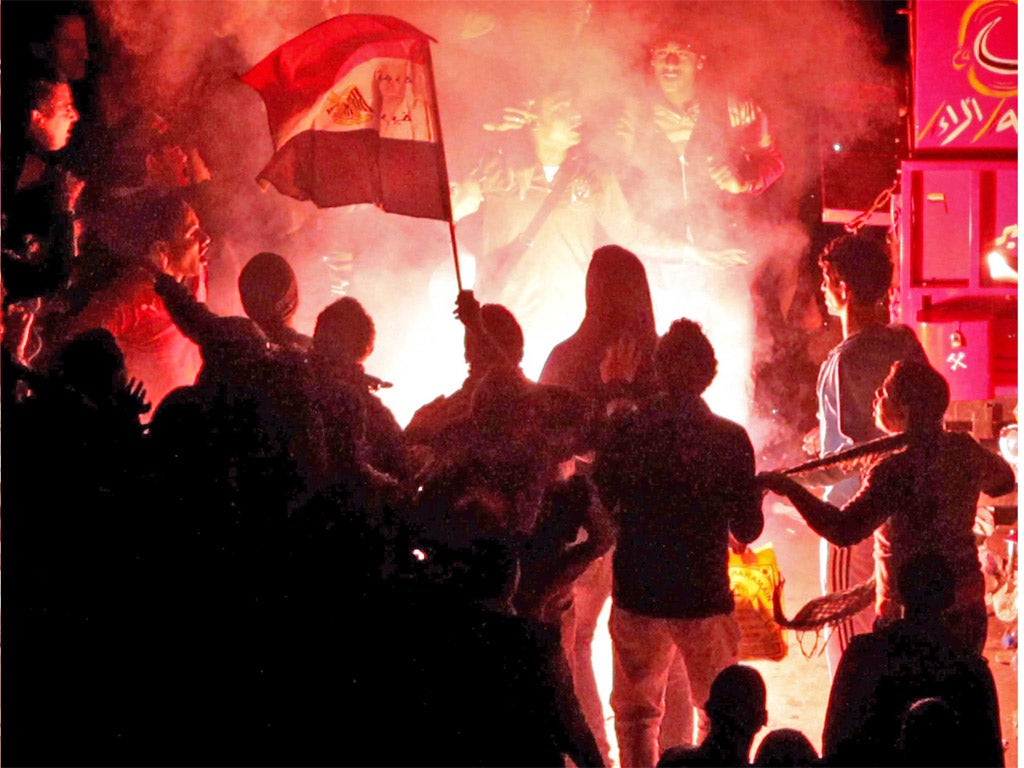Egypt's generals laid on a celebration – but the people just wanted to protest
The first anniversary of the revolution that ousted Mubarak reveals a nation unsure of its future

Your support helps us to tell the story
From reproductive rights to climate change to Big Tech, The Independent is on the ground when the story is developing. Whether it's investigating the financials of Elon Musk's pro-Trump PAC or producing our latest documentary, 'The A Word', which shines a light on the American women fighting for reproductive rights, we know how important it is to parse out the facts from the messaging.
At such a critical moment in US history, we need reporters on the ground. Your donation allows us to keep sending journalists to speak to both sides of the story.
The Independent is trusted by Americans across the entire political spectrum. And unlike many other quality news outlets, we choose not to lock Americans out of our reporting and analysis with paywalls. We believe quality journalism should be available to everyone, paid for by those who can afford it.
Your support makes all the difference.A year ago to the day, Noha Tarek was standing in the same neighbourhood, outside the same mosque, under the same stagnant regime serving the same old President Mubarak. Precisely 365 days later, she was back. The president had changed, but her sense of despair had not.
"I don't feel like it's a celebration," the political science student said yesterday as she waited outside Mostafa Mahmoud mosque in western Cairo, the starting point for one of numerous rallies heading towards Tahrir Square, the heart of last year's revolution. "I don't even feel a bit of happiness. Hosni Mubarak was the face of the regime. Right now we're challenging not just the face. We're challenging the whole system."
Her views are shared by many others who feel that the ruling Military Council – which took power 16 days after the first waves of protest on 25 January last year – is entrenching the old networks of influence.
When Egypt's ruling generals first announced plans for this week's "celebration" – a jingoistic mix of pomp and pageantry replete with military fly pasts and navy boats on the Nile – there were whispers among some activists that the revolution had been hijacked.
But if the generals did intend to "co-opt" the first anniversary of the start of Egypt's revolution, they only needed to look at the sheer weight of numbers yesterday as a reminder of what can happen when the Arab street begins to boil. In the capital, thousands of chanting, flag-waving marchers stretched back along the main dual carriageways for as far as the eye could see.
Cries of "Freedom! Freedom!" echoed through the tree-lined boulevards as demonstrators called on onlookers to come and join them from the apartment blocks. In a stark reminder of the economic imbalances which brought many on to the streets last year, the route wound its way past plush menswear stores, a Peugeot showroom and a glitzy branch of BNP Paribas, the European bank.
Some activists wore masks of Egypt's martyrs, including Khaled Said, the young man whose death at the hands of police in 2010 made him an emblem of state violence. "When I see the martyrs, I want to continue the revolution," said 15-year-old Saif el-Islam, who wore a mask of Mina Daniel, a Christian who was killed during an outbreak of violence involving the army in October.
On Monday the Egyptian parliament held its inaugural session following elections which saw the Muslim Brotherhood sweep to power and trounce the secular and liberal forces lined up against it. The group was outlawed by successive presidents, and its emergence at the vanguard of Egyptian politics could mark a sea change in Middle Eastern diplomacy.
But many activists question whether the ruling generals will ever truly step aside, pointing to the crackdowns on foreign aid agencies and arrests of protesters as evidence of its determination to cling to power. And there are plenty of Egyptians who do not want to eject the generals.
Stuck in the traffic as lines of protesters filed past, taxi driver Galal Mohammad made clear his feelings on yesterday's rally. "I supported the revolution of January 25," he said. "But do I want the downfall of the military government? No I don't."
Word on the street: The verdict
"Everyone still remembers the revolution and the people who died. I have hope that we can remove the whole system, not just Mubarak" - Eman Amrl, unemployed
"I feel angry and frustrated. I'm annoyed with those sat at home ... When people ask why I'm going back to Tahrir, I say it's simple – nothing has changed." - Sara Khafaga, engineer
"We want to tell the new people in parliament, 'If you don't do the right thing we'll be back again'. Up until today, we are still at the beginning of the revolution." - Magdi Mohammad, artist
"I'm very proud. I think we did something today. Before, under Mubarak, we used to wake up and know the day would be just the same as the day before." - Mourad Askar, IT engineer
Join our commenting forum
Join thought-provoking conversations, follow other Independent readers and see their replies
Comments